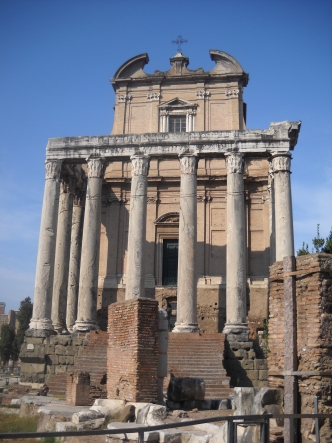|
It's very clear even to the architecturally naïve that just one of the Forum's columns, whether cast or carved, whether doric or ionic or corinthian requires a staggering amount of work. Each plinth, each block on which each column stands requires even more work. The attention to detail is simply extraordinary.
If carved, both columns and plinths require meticulous filigree delicate chipping away solid marble. Then multiply all this work by however many columns the Forum requires. Throw in a few monumental statues for good measure ... that, plus a roof or (in all likelihood) a dome. Then exponentiate all that by hundreds and hundreds and hundreds of similar still standing structures built over a period of ... two ... thousand ... years ... and more, and you have just the barest taste of what it took to construct Rome, "the eternal city".
It's been said "Rome wasn't built in a day". Really. No kidding!
If you can stop yourself just for a moment from being blown away by standing in the living presence of this centuries old - no, millennia old - city, if you can take your mind off all its landmarks and what it took to build each and all of them, you may start to get something else, something at first imperceptible, something akin to a context against which all your awe shows up.
It's the context of human being. As you stand in the midst of all this, as you contemplate all ancient and modern Rome's landmarks, you start to realize the time continuum civilized human beings have been around here is two ... thousand ... years ... and more old. And you realize this context of human being then obviously wasn't a whole lot different than the context of human being today. OK, so Julius Cæsar didn't have internet access, and gladiators at the Colosseum didn't stop off on the way to work at the local Starbucks. But the conversation, the set of concerns, the culture of human beings then was hardly any different then than the conversation, the set of concerns, the culture of human beings today.
